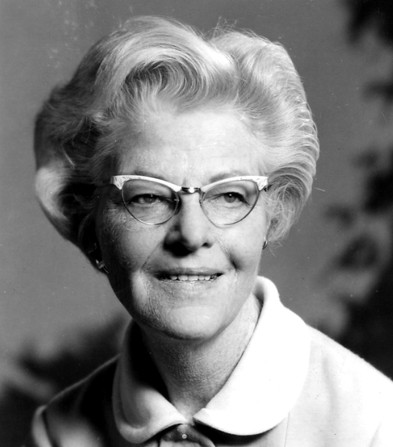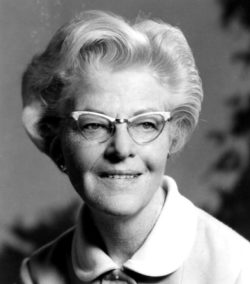Rosa Keller
Rosa Freeman Keller spent her life fighting for equal rights for all New Orleans citizens, including the desegregation of the New Orleans public transportation system, school system, and libraries.

Courtesy of State Library of Louisiana
Rosa Freeman Keller. Unidentified
Coca Cola heiress and racial pioneer Rosa Freeman Keller worked tirelessly throughout her long life for those less fortunate than herself, particularly New Orleans’s African American residents. Though her elite social background made her perhaps an unlikely social activist, Keller helped lead the fight for the integration of public schools and transportation facilities in New Orleans. She never hesitated to use her position in powerful organizations, such as the Independent Women’s Organization, the National Urban League, or the Young Women’s Christian Association, to advocate for racial equality. Further, Keller encouraged women to play an active role in the political process. The Keller Family Foundation currently continues her legacy.
Early Life
Rosa Freeman was born March 31, 1911, to Alfred Bird “A.B.” Freeman and Ella West. While her mother descended from a family of southern aristocrats, Rosa’s father was a salesman—a “nobody from nowhere”—until he made a fortune with his fledgling Coca Cola business. With his success, the family gained entrance into the world of the New Orleans elite. After high school, Rosa Freeman attended Sophie Newcomb College for a year and then, anxious to establish her independence, transferred to Hollins College in Virginia, only to drop out a year later. At her social debut in New Orleans, Rosa Freeman met Charles Keller II, whom she married in 1932. After a few itinerant years because of Charles’s work in the armed services, the Keller family settled in New Orleans in 1944.
Social Activism
Already a member of the New Orleans chapter of the League of Women Voters, Keller began her foray into the world of politics working on voter registration. When her mother died in 1945, Keller was asked to serve on the local YWCA board, an integrated organization that deeply impacted her views on race relations. In 1947, seeking to alleviate the housing shortage for New Orleans’s Black families, Rosa and Charles Keller, along with friends and philanthropists Edith and Edgar Stern, financed the construction of Pontchartrain Park, one of the first middle-class Black communities in the country.
Keller expanded her political involvement in the early 1950s when she helped organize the Independent Women’s Organization, created to support the election of moderate mayoral candidate deLesseps Morrison. When Morrison asked Keller to serve on the board of the public library system, she readily accepted, becoming the first woman to serve on a citywide board. Almost immediately Keller brought controversy to her position when she set out to integrate the New Orleans public library system—a goal she eventually achieved.
Keller continued to serve the New Orleans Black community in a variety of ways. She chaired the board of Flint-Goodridge Hospital, a facility that catered to the Black community. In this capacity, she fought for and won access to Blue Cross coverage for the New Orleans Black community, and insisted that African American medical students have access to New Orleans’s medical libraries. Keller also served as president of the New Orleans Urban League, and on the boards of numerous citywide interracial organizations.
In 1953, Keller decided that it was time the League of Women Voters, an organization she loved, begin the process of admitting Black members. With the help of her progressive peers, she succeeded in integrating the organization in 1955. State laws passed in the wake of the U.S. Supreme Court’s decision in Brown v. Board of Education, however, forced to the league to resegregate a year later. Through Keller’s persistence, the league permanently achieved integrated status in 1963.
In 1958 Keller led the fight to desegregate the New Orleans public transportation system, but she considered her efforts to integrate the city’s public schools as “her war.” Toward this end, Keller helped create Save Our Schools (SOS), an organization dominated by elite white women in the New Orleans community. During the 1960 New Orleans School Crisis, when the first Black children attended formerly all-white schools, SOS ferried children to and from the integrated schools. They also raised monies for the Black and white families who kept their children in the schools and lobbied the state legislature on behalf of integrated schools. Much to the chagrin of some family members, Keller also personally financed the legal fight to desegregate Tulane University in 1963. Through the years, Rosa Keller had no qualms about holding interracial gatherings in her Uptown home, though it was considered a serious breach of racial etiquette at the time.
Keller received numerous honors for her work on racial issues in New Orleans, including the Times-Picayune Loving Cup Award, which honors New Orleans residents who have worked unselfishly for the community without expectation of public acclaim or material reward. She also received an honorary alumnus degree from Newcomb College and an honorary doctorate from Dillard University. She died in April 15, 1998, in New Orleans. The Keller Family Foundation, established in 1949, continues to provide monies to sustain and improve the New Orleans community.
